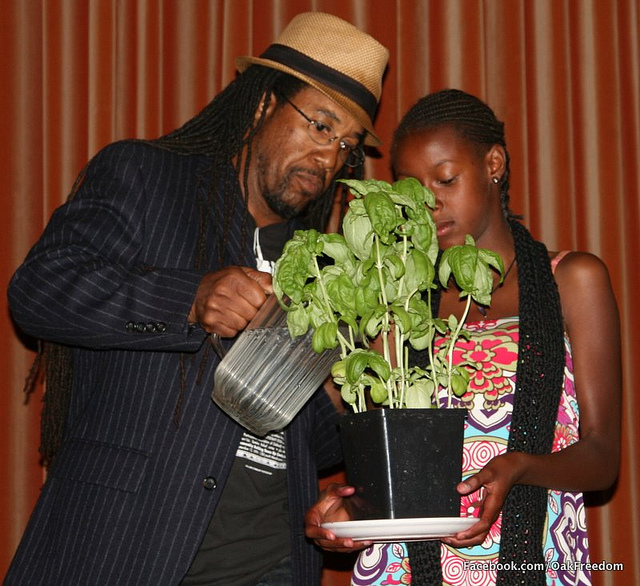Schools bear much of the accumulated sludge of history and culture and are often tasked with addressing them. Racism, classism, patriarchy, homophobia–pretty much all the isms, archys, and phobias will find their way into the classroom.
And while I get angry when I hear stories where students or families are disrespected, I am very hopeful for Oakland when I see the actual community responses. This was highlighted in the really impressive work that young women and their allies did in creating a responsive OUSD sexual harassment policy, and also the responses of school communities to “colonial day” and colonial mentalities.
Even in the bad, if we can move past our own anger, trauma and baggage, we can come together to create good, and in the end that’s what keeps me going. So let’s talk about a few recent examples of the good in The Town.
Ending “slap ass Fridays”
Yeah “slap ass Fridays” (SAF) is a thing in some Oakland schools. It’s a weekly ritual, where “boys will be boys” and at least some staff turn the other way. I wrote about this when I first read the Alliance for Girls report describing the challenges our young women face.
Our youth and some allies did more than write, they did something concrete. They asked young women about their experiences and developed a new, responsive, sexual harassment policy that was just passed by the Board.
It is a restorative policy that better identifies the nature and harm of sexual harassment and clarifies the role of the school in investigating and addressing it. And also creates a climate where students can safely bring complaints.
A policy by itself won’t make the change we need, but an approach that starts with students will, if we adults can learn from them. And SAF has been a thing for a long time, adults who work in the district now, remember it, and have similar stories, and we adults have allowed it to continue to exist. Ending it starts with students but can’t end with them.
A hard look at “Colonial Day”
I wrote about an Oakland school’s “colonial day” last week. I have my own “colonial day” story. As the only Black kid in my elementary class, I was asked to sit colonial day out in the corner because I didn’t have a place or would presumably be a slave.
That was upstate NY 100 years ago, so I was shocked to hear that this was still a thing in Oakland. And that it took place for the last 8 years in at least one school and likely more. Mind you this is an approved curricular unit, complete with a “slave’s quarters station.” And I bet its happening in a lot of places. This is not an argument about studying the colonial period, its one about celebrating it, or not providing critical context.
And I am pretty sure I would not want my kid to be one of the few darkies, circulating through the “slave quarters” station in 5th grade. You would have to be a really great teacher who laid a whole lot of context that these young minds absorbed, for that not to be an alienating experience.
When I posted about “colonial day” another school reported its own colonial day. But the thing that I loved was how people reacted, Jaquin Miller re-appropriated the lessons and teachers created their own curricula (which I would love to see btw).
Meanwhile, families at the original “colonial day” school are looking hard at making changes. I didn’t have one annoying peep about how we should keep “colonial day”, or rants against curricular political correctness.
“Colonial day” is wack, and people get that.
Again, “colonial days” have been happening forever in the U.S. For many of us, colonialism is nothing to celebrate. This is the Wikipedia definition which is kinder than others,
Colonialism is the establishment of a colony in one territory by a political power from another territory, and the subsequent maintenance, expansion, and exploitation of that colony. Colonialism involves unequal relationships between the colonial power and the colony and often between the colonists and the indigenous peoples.
If “colonial day” is treated critically, maybe. But this pictures history through the colonizer’s eyes, which is an uncomfortable lens for some of us, and certainly not the only one to view it through. The good news—we turned over a rock, it was kind of gross, and rather than just putting it back down, the community is coming together around making a change.
The Need for Community Action and Community Healing
I also got a great note from a parent who (among many others) had been struggling with her school administration; the families and staff organized. And from OUSD Board members to high level staff at OUSD, to the NAACP and community based organizations, they made their voice heard, and action came. “I never knew parents could be so powerful” she ended her note. These small victories count.
All of this is hard work, and requires us to come together to do it. I know I am not always the most diplomatic guy, but a wiser Brother kind of talked me down on some of these issues recently. And I really appreciate that Oakland’s diverse communities have come together to build community and do the hard work of shedding some of our historical legacies.
We have a lot of accumulated baggage, long practiced habits and patterns of oppression, and a lot of restorative work to do. I think we also have a powerful vision of a more equitable future, bridging that is the work of the community, and given how I have seen students, staff, families and allies come together thus far, I am hopeful.

